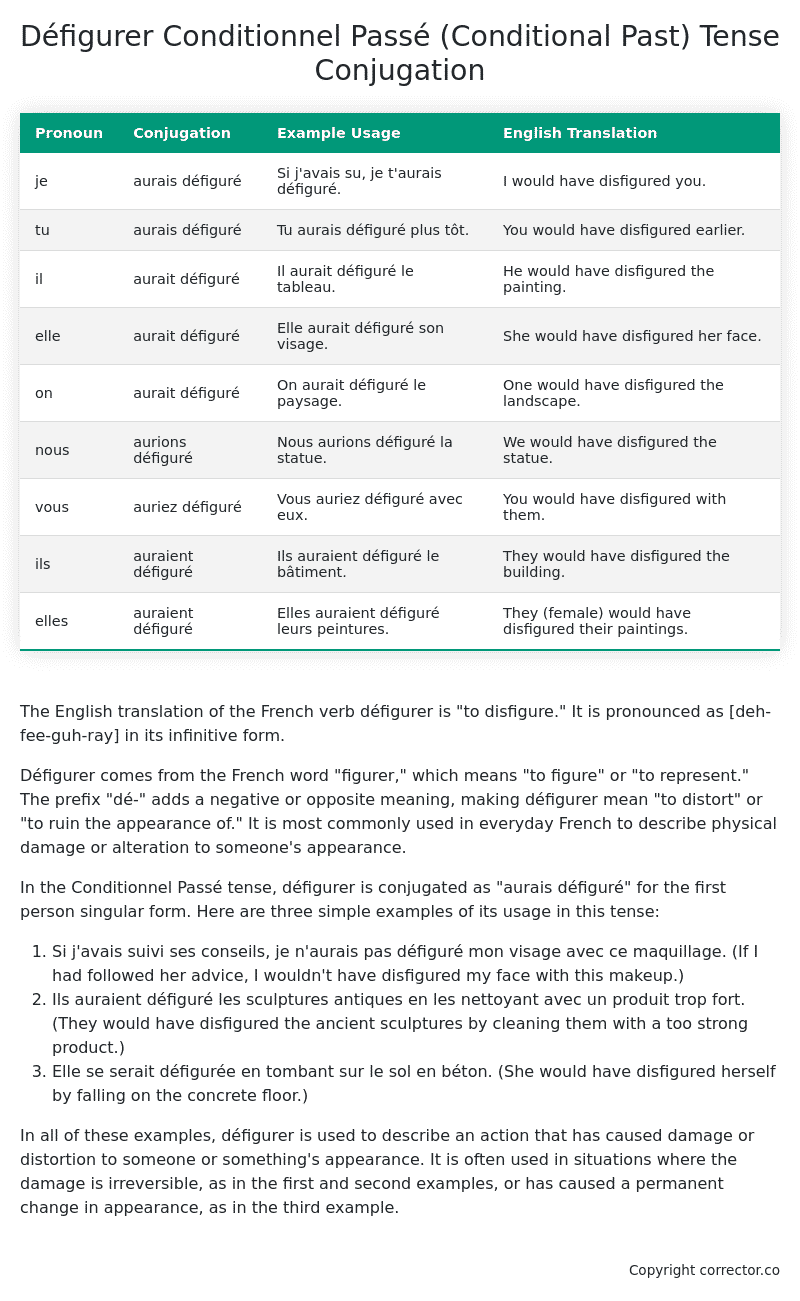Conditionnel Passé (Conditional Past) Tense Conjugation of the French Verb défigurer
Introduction to the verb défigurer
The English translation of the French verb défigurer is “to disfigure.” It is pronounced as [deh-fee-guh-ray] in its infinitive form.
Défigurer comes from the French word “figurer,” which means “to figure” or “to represent.” The prefix “dé-” adds a negative or opposite meaning, making défigurer mean “to distort” or “to ruin the appearance of.” It is most commonly used in everyday French to describe physical damage or alteration to someone’s appearance.
In the Conditionnel Passé tense, défigurer is conjugated as “aurais défiguré” for the first person singular form. Here are three simple examples of its usage in this tense:
- Si j’avais suivi ses conseils, je n’aurais pas défiguré mon visage avec ce maquillage. (If I had followed her advice, I wouldn’t have disfigured my face with this makeup.)
- Ils auraient défiguré les sculptures antiques en les nettoyant avec un produit trop fort. (They would have disfigured the ancient sculptures by cleaning them with a too strong product.)
- Elle se serait défigurée en tombant sur le sol en béton. (She would have disfigured herself by falling on the concrete floor.)
In all of these examples, défigurer is used to describe an action that has caused damage or distortion to someone or something’s appearance. It is often used in situations where the damage is irreversible, as in the first and second examples, or has caused a permanent change in appearance, as in the third example.
Table of the Conditionnel Passé (Conditional Past) Tense Conjugation of défigurer
| Pronoun | Conjugation | Example Usage | English Translation |
|---|---|---|---|
| je | aurais défiguré | Si j’avais su, je t’aurais défiguré. | I would have disfigured you. |
| tu | aurais défiguré | Tu aurais défiguré plus tôt. | You would have disfigured earlier. |
| il | aurait défiguré | Il aurait défiguré le tableau. | He would have disfigured the painting. |
| elle | aurait défiguré | Elle aurait défiguré son visage. | She would have disfigured her face. |
| on | aurait défiguré | On aurait défiguré le paysage. | One would have disfigured the landscape. |
| nous | aurions défiguré | Nous aurions défiguré la statue. | We would have disfigured the statue. |
| vous | auriez défiguré | Vous auriez défiguré avec eux. | You would have disfigured with them. |
| ils | auraient défiguré | Ils auraient défiguré le bâtiment. | They would have disfigured the building. |
| elles | auraient défiguré | Elles auraient défiguré leurs peintures. | They (female) would have disfigured their paintings. |
Other Conjugations for Défigurer.
Le Present (Present Tense) Conjugation of the French Verb défigurer
Imparfait (Imperfect) Tense Conjugation of the French Verb défigurer
Passé Simple (Simple Past) Tense Conjugation of the French Verb défigurer
Passé Composé (Present Perfect) Tense Conjugation of the French Verb défigurer
Futur Simple (Simple Future) Tense Conjugation of the French Verb défigurer
Futur Proche (Near Future) Tense Conjugation of the French Verb défigurer
Plus-que-parfait (Pluperfect) Tense Conjugation of the French Verb défigurer
Passé Antérieur (Past Anterior) Tense Conjugation of the French Verb défigurer
Futur Antérieur (Future Anterior) Tense Conjugation of the French Verb défigurer
Subjonctif Présent (Subjunctive Present) Tense Conjugation of the French Verb défigurer
Subjonctif Passé (Subjunctive Past) Tense Conjugation of the French Verb défigurer
Subjonctif Imparfait (Subjunctive Imperfect) Tense Conjugation of the French Verb défigurer
Subjonctif Plus-que-parfait (Subjunctive Pluperfect) Tense Conjugation of the French Verb défigurer
Conditionnel Présent (Conditional Present) Tense Conjugation of the French Verb défigurer
Conditionnel Passé (Conditional Past) Tense Conjugation of the French Verb défigurer (this article)
L’impératif Présent (Imperative Present) Tense Conjugation of the French Verb défigurer
L’infinitif Présent (Infinitive Present) Tense Conjugation of the French Verb défigurer
Struggling with French verbs or the language in general? Why not use our free French Grammar Checker – no registration required!
Get a FREE Download Study Sheet of this Conjugation 🔥
Simply right click the image below, click “save image” and get your free reference for the défigurer Conditionnel Passé tense conjugation!

Défigurer – About the French Conditionnel Passé (Conditional Past) Tense
Formation
Common Everyday Usage Patterns
Expressing Unreal Past Scenarios
Polite Requests or Suggestions
Expressing Doubt or Uncertainty
Interactions with Other Tenses
Conditional Present
Indicative Past Tenses
Conditional Future
Summary
Want More?
I hope you enjoyed this article on the verb défigurer. Still in a learning mood? Check out another TOTALLY random French verb conjugation!


